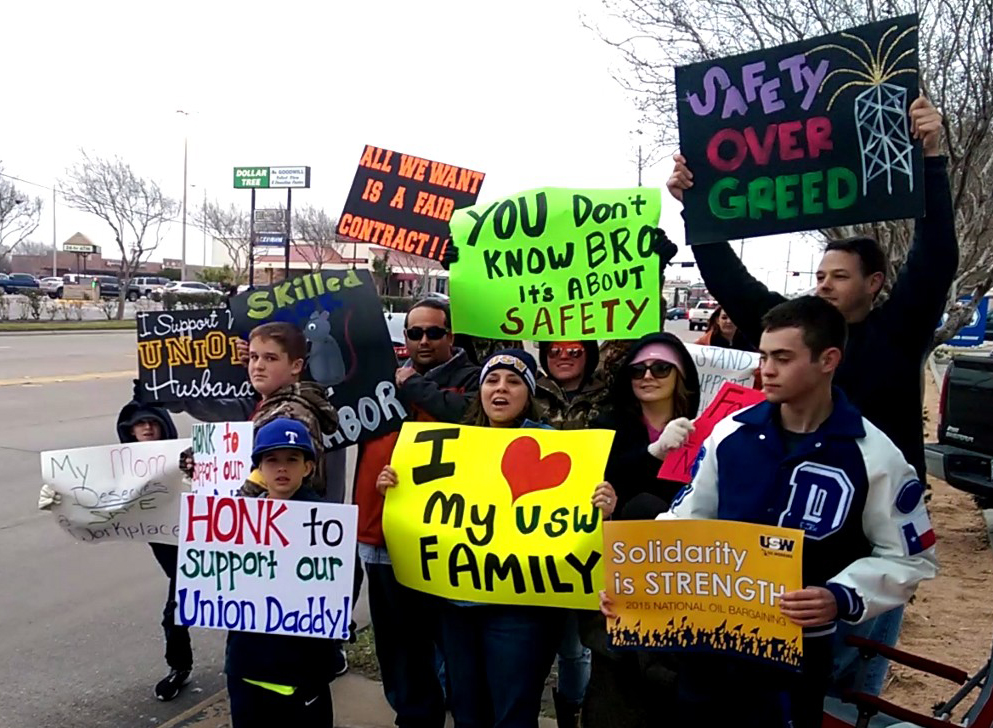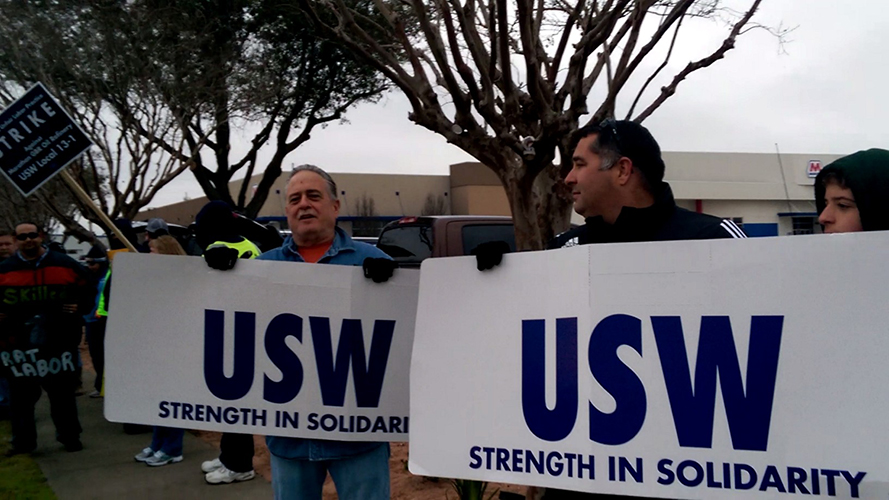
USW strike at standstill

Beginning the week of Sunday Feb. 1, 2015, United Steel Workers International (USW) members stood in picket lines and gathered at local union halls. USW International initiated the strike over concerns about staffing, hours, and safety. Union representatives and lawyers, acting on behalf of 69 oil companies led by Shell, debated proposals and tried to reach an agreement on the terms of a new contract between the USW International and National Bargaining Council.
“Oil companies are pulling steelworkers from their jobs and sending them on temporary assignments that can last up to two years,” said Lynne Hancock, spokeswoman for USW Communications.
Hancock explained that this creates the need for another steelworker to work overtime in order to cover the work of the relocated employee who was placed on a temporary assignment.
Hancock stated this reassignment practice results in a difference in the number of men on record and the number of men actually present at the site at a given time and misrepresents actual staffing levels.
Representatives from USW assert that forced overtime leads to fatigue that results in a higher occurrence of accidents. Hancock and picketers both stated that this strike is not about wages, it is about securing contracts that guarantee safer work loads and hours worked.Steelworkers protested in front of the Marathon Oil office in Texas City and at the gates of Shell’s Deer Park oil refinery site beginning Feb. 1 and continued throughout the week. They were joined by family members and concerned supporters.

“We just want a fair contract and we want community safety!” said union members at the local 13-1 Hall in Texas City. “International needs to move faster.”
The union initiated the strike over concerns about staffing, hours and safety concerns. “This work stoppage is not about wages; we are concerned about community safety, because of leaks, fires, releases and explosions.” Hancock stressed. “We want the industry to work with us to establish better staffing hours that are safer.”
George F. Smalley, associate director of communications, media and marketing at LyondellBasel expressed disappointment that USW International representatives had called for union employees to begin striking and picketing. “We were further disappointed to receive notice late last night that USW International representatives had called for our union employees at Houston Refining LP to begin striking and picketing on February 1, 2015 at 12:01AM.”
“International USW and Royal Dutch Shell, which led negotiations on behalf of U.S. refinery operations as part of the National Oil Bargaining Program, have been negotiating since Jan. 22nd to reach an agreement,” Smalley said.
Smalley explained that LyondellBasell’s Houston refining site had already activated what he called a “well-developed and pre-prepared work continuation plan” focusing on operational safety and uninterrupted service.
“We are relatively close to the industry, the gulf coast is home to 1/3 of all national oil refineries. The concern to the community about leaks, releases, fires and explosions does exist and there are several resources for the community to find information about occurrences at local industrial sites,” said Lisa Coen, Environmental Health and Safety Coordinator for UHCL Risk Management Department.
“Bay Area Community Advisory Panel and Local Emergency Planning Commission host community outreach events and host a public email list. BAYCAP publishes records of occurrences and also a schedule of planned events,” said Coen. “East Harris County Manufacturers Association operates Care Line at 855-855-2237, available to address community concerns and questions about events at local sites.”
USW International has now called for work stoppages at U.S. refineries in Texas, California, Kentucky, Washington, Indiana and Ohio.
“Strikes work if the cost of accepting the demands is less than the cost of the strike to management and the benefit to workers from getting their demands exceeds the cost of the strike to the workers,” said Stephen Cotton, assistant professor of economics at UHCL. “Keep in mind that one of the costs of striking to management is that it emboldens workers to strike again. Since many refineries can operate for quite a while on skeleton crews, this is going to be a tough requirement for the striking workers to meet. Can strikes be effective if strike contingencies have been developed? Sure, but it’s harder than if you catch management flat-footed.”
The price of West Texas Intermediate Crude oil bottomed Jan. 29, 2015, and has consistently risen beginning Jan. 30, 2015. The price of Brent Crude Oil bottomed Jan. 13, 2015, and has risen consistently since Jan. 14, 2015. National average gas price has climbed from $2.13 Feb. 1, 2015 to $2.23 Feb 12, 2015.
Although gas prices have risen since the beginning of the strike, “Oil prices are being driven by changes in current and projected international supply and demand,” explained Cotton. “Individual firms do not have the market power to ‘manipulate’ oil prices.”
Community information regarding events and occurrences at local industrial sites can be found at:

USW have valid point…I hope things work out on both ends. The oil business affects us all.
Great read Geoffrey!
I wonder if there could be a different approach before a strike even happens…lack of communication between USW and the oil companies?
Great read Geoffrey!